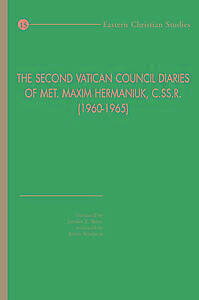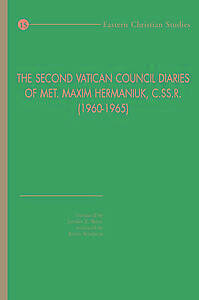
- Retrait gratuit dans votre magasin Club
- 7.000.000 titres dans notre catalogue
- Payer en toute sécurité
- Toujours un magasin près de chez vous
- Retrait gratuit dans votre magasin Club
- 7.000.000 titres dans notre catalogue
- Payer en toute sécurité
- Toujours un magasin près de chez vous
The Second Vatican Council Diaries of Met. Maxim Hermaniuk, C.Ss.R. (1960-1965)
K Schelkens, Jz Skira
42,00 €
+ 84 points
Description
The Second Vatican Council diaries of the late Met. Maxim Hermaniuk, C.Ss.R., provide a captivating glimpse into the public and behind-the-scenes work of this Council Father. Hermaniuk was a graduate of the Catholic University of Louvain, and taught for a number of years in Belgium in the study houses of the Redemptorist order before being named the first Metropolitan of the Ukrainian (Eastern) Catholics in Canada. Hermaniuk was by far the most active of all the Ukrainian Catholic bishops at the Council. Much of his work was carried out through his membership in the Preconciliar Theological Commission and in the influential Secretariat for Christian Unity. Hermaniuk's activities centred on his proposal to establish an Apostolic College, as well as his call to nullify the anathemas of 1054 between the East and West. He was a strong advocate of ecumenical dialogue with other Christians, particularly with the Eastern Orthodox churches. His work also included the promotion of dialogue with other faiths. In reference to the Ukrainian Catholic Church, which was at the time severely persecuted in the Soviet Union, one sees his affirmations of the particularity and dignity of his Church, his promotion of religious liberty, and his condemnations of religious and political oppression. These diaries also reveal how the Ukrainian Catholic bishops responded to the pastoral needs of their faithful - in liturgy, catechesis, education, mission and ecclesial governance - and the call to renewal made by the Council. Finally, the diaries are unique since they are one of the very few accounts of the Council by an Eastern Catholic Council Father.
Spécifications
Parties prenantes
- Auteur(s) :
- Editeur:
Contenu
- Nombre de pages :
- 333
- Langue:
- Anglais
- Collection :
- Tome:
- n° 15
Caractéristiques
- EAN:
- 9789042925809
- Date de parution :
- 06-03-12
- Format:
- Livre broché
- Format numérique:
- Trade paperback (VS)
- Dimensions :
- 160 mm x 239 mm
- Poids :
- 566 g







